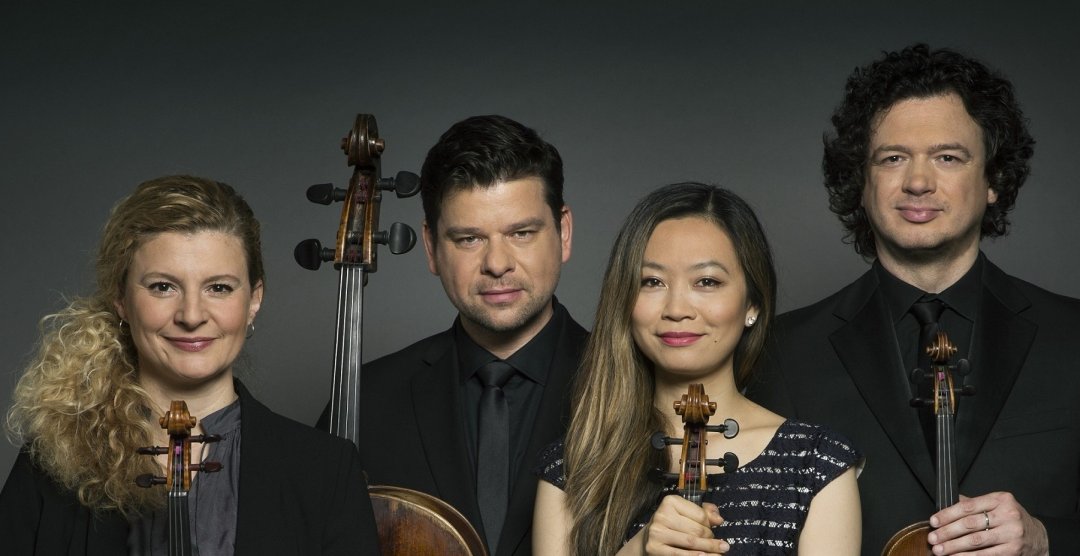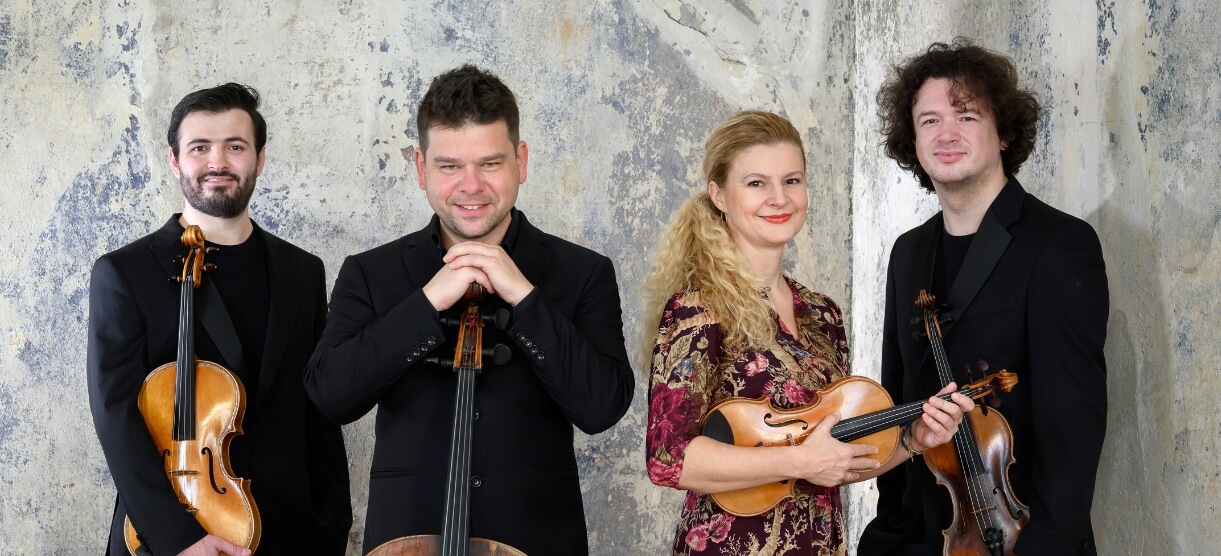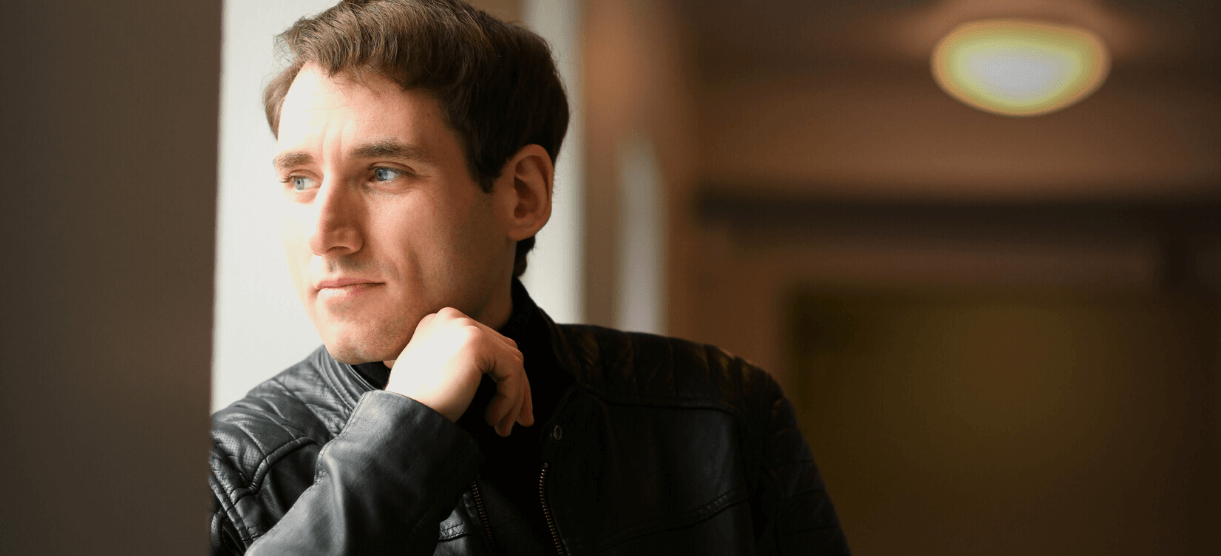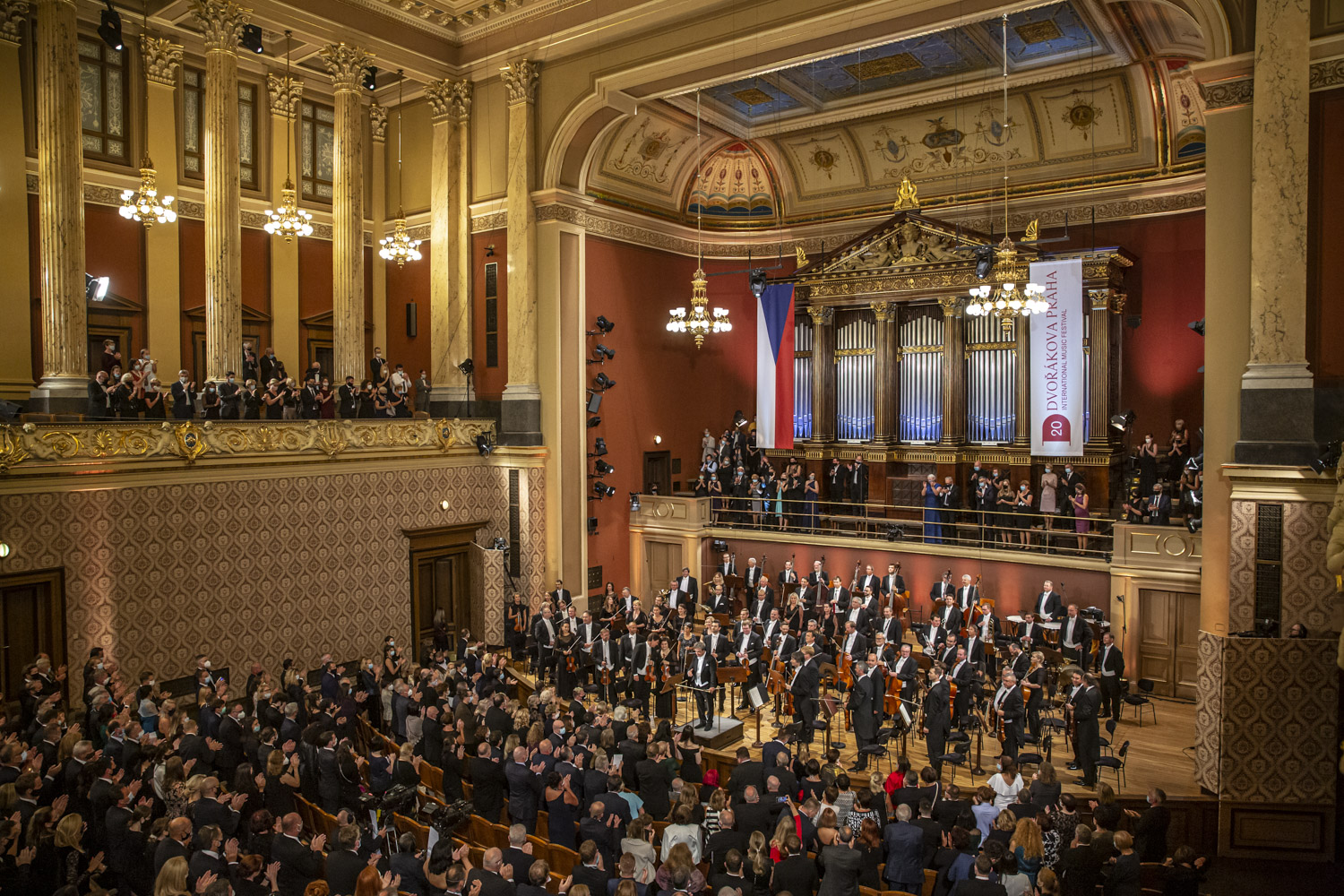
Dmitry Shostakovich: Piano Quintet in G Minor, Op. 57
Antonín Dvořák: Piano Trio No. 4, Op. 90, B. 166, ʻDumkyʻ
The concluding concert of the Chamber Series presents encounters between its protagonists –series curator and pianist Boris Giltburg with the Pavel Haas Quartet – as well as between two great composers of the 19th and 20th centuries. They will be heard in reverse chronological order, however, so the last word will belong to the Czech composer to whom the whole festival and the Dvořák Collection series are dedicated. This is also a meeting of two masters of contrast: one who tends to be kind and gentle, the other, often sharply ironic.
Dmitri Shostakovich wrote his Piano Quintet in G Minor in 1940. Before that, he had been hard at work on his Symphony No. 6 and an arrangement of Mussorgsky’s opera Boris Godunov, so it might seem that writing this quintet was something of a breather for him. This transparent, classical-sounding music is still teeming with emotion and playfulness with a constant emanation of melancholy. Dvořák’s last piano trio, nicknamed “Dumky”, is oriented towards the east but in a diametrically opposite mood. It took inspiration from a Ukrainian song form with an alternation of wild and pensive passages.
The Pavel Haas Quartet stands as one of the world’s premier chamber ensembles, commanding the most prestigious concert stages globally. Its recordings have earned it five Gramophone Awards, along with a multitude of other significant accolades. In 2022, BBC Music Magazine ranked the ensemble among the top 10 greatest string quartets of all time.
The Quartet’s performances regularly grace revered venues such as Concertgebouw and Muziekgebouw in Amsterdam, NCPA in Beijing, the Philharmonie and Konzerthaus in Berlin, Queen's Hall in Edinburgh, Elbphilharmonie in Hamburg, Wigmore Hall in London, Philharmonie in Luxembourg, Carnegie Hall in New York, Théâtre de la Ville in Paris, Accademia di Santa Cecilia in Rome, LG Arts Centre in Seoul, Musikverein in Vienna, and Tonhalle in Zürich, etc.
In the 2024/2025 concert season, the Pavel Haas Quartet will once again return to illustrious Carnegie Hall and London’s Wigmore Hall. The ensemble will embark on a European tour during the first half of the season, visiting Austria, Germany, Belgium, and the United Kingdom. It will close out 2024 with a tour across the United States. Audiences in the Czech Republic can look forward to several performances at the Dvořák Prague Festival, where the Quartet has served as an artist-in-residence and curator of chamber concerts since September 2022, including a three-season exploration of Dvořák’s string quartets and chamber works.
The Pavel Haas Quartet records exclusively for Supraphon. Its most recent album, *Brahms Viola and Piano Quintets* (2022), featuring Boris Giltburg and former member Pavel Nikl, met with widespread acclaim. The Quartet’s prior release, *Shostakovich String Quartets* (2019), garnered the Recording of the Year prize at the Classic Prague Awards, and The Times hailed it as one of the 100 best recordings of the year.
The ensemble has received five Gramophone Awards for its recordings of Dvořák, Smetana, Schubert, Janáček, and Haas as well as for Dvořák’s String Quartets No. 12 “American” and No. 13, which also took the 2011 Gramophone Recording of the Year award. Additional honours include a BBC Music Magazine Award and the 2010 Diapason d’Or de l’Année for the ensemble’s recording of Prokofiev’s String Quartets No. 1 and No. 2.
A victory at the Paolo Borciani Competition in Italy in 2005 marked the first milestone of the Pavel Haas Quartet’s career. A nomination for ECHO Rising Stars in 2007 followed, along with participation in the BBC New Generation Artists program from 2007-2009, and a Borletti-Buitoni Trust Special Ensemble Scholarship in 2010.
The Pavel Haas Quartet was founded in 2002 by Veronika Jarůšková, and violist Pavel Nikl, who remained a member until 2016 and who continues to be a frequent guest performer at string quintet concerts. The ensemble’s members studied under the legendary violist Milan Škampa of the Smetana Quartet. The Quartet takes its name from the Czech composer Pavel Haas (1899–1944), Janáček’s most promising pupil, who was imprisoned by the Nazis in the Terezín ghetto in 1941 and tortured to death three years later in the Auschwitz concentration camp. His musical legacy includes three exquisite string quartets.
source: artevisio

The Moscow-born, Israeli pianist is lauded across the globe as a deeply sensitive, insightful and compelling interpreter. Critics have praised his “singing line, variety of touch and broad dynamic palette capable of great surges of energy” (Washington Post) as well as his impassioned, narrative-driven approach to performance.
In recent years Giltburg has engaged in a series of in-depth explorations of major composers. To celebrate the Beethoven anniversary in 2020 he embarked upon a unique project to record and film all 32 of Beethoven’s piano sonatas across the year. He also recorded the complete concerti with Vasily Petrenko and the Royal Liverpool Philharmonic Orchestra on Naxos.
In 2021-2023 Giltburg explores the complete works of Ravel, performing the solo works across Bozar, Flagey and the Amsterdam Musiekgebouw, and the whole cycle at Wigmore (including the Violin Sonatas with Alina Ibragimova). He also plays Ravel’s concerti with the Orchestre National de France/Macelaru at Bozar, Brussels Philharmonic/Prieto at Flagey, and Residentie Orkest/Bihlmaier at the Concertgebouw.
Widely recognized as a leading interpreter of Rachmaninoff, Giltburg completes his recording of Rachmaninoff’s solo works in 2023 and releases the last disc in his acclaimed concerto cycle. Giltburg also plays Rachmaninoff concerti with Sakari Oramo and the BBC Symphony at the Barbican, Tomáš Netopil and the Czech Philharmonic, Nicholas Collon and the Finnish Radio Symphony, and Brussels Philharmonic and Giancarlo Guerrero at Flagey.
Giltburg regularly plays recitals in the world’s most prestigious halls, including the Amsterdam Concertgebouw, Carnegie Hall, Hamburg Elbphilharmonie, Wiener Konzerthaus and London Southbank Centre. He has worked with Philharmonia Orchestra, London Philharmonic, Czech Philharmonic, Oslo Philharmonic, Dresden Philharmonic, NHK Symphony and at the BBC Proms. In 21/22 he debuted at the Santa Cecilia di Roma with Kirill Petrenko.
Giltburg’s collaboration with Naxos began in 2015, winning the Opus Klassik award for Best Soloist Recording (Rachmaninoff concerti and Etudes Tableaux) and a Diapason d’Or (Shostakovich concerti and his own arrangement of Shostakovich’s 8th String Quartet). He also won a Gramophone Award for the Dvorak Piano Quintet on Supraphon with the Pavel Haas Quartet, as well as a Diapason d’Or for their latest joint release, the Brahms Piano Quintet.
Giltburg feels a strong need to engage audiences beyond the concert hall. His blog “Classical music for all” is aimed at a non-specialist audience, and he complements it with articles in publications such as Gramophone, BBC Music Magazine, Guardian, Times and Fono Forum. During the lockdown period in spring 2020, Giltburg regularly streamed live performances and masterclasses from home, with over 1 million views.
Source: Intermusica

The Rudolfinum is one of the most important Neo-Renaissance edifices in the Czech Republic. In its conception as a multi-purpose cultural centre it was quite unique in Europe at the time of its construction. Based on a joint design by two outstanding Czech architects, Josef Zítek and Josef Schultz, a magnificent building was erected serving for concerts, as a gallery, and as a museum. The grand opening on 7 February 1885 was attended by Crown Prince Rudolph of Austria, in whose honour the structure was named. In 1896 the very first concert of the Czech Philharmonic Orchestra took place in the Rudolfinum's main concert hall, under the baton of the composer Antonín Dvořák whose name was later bestowed on the hall.
